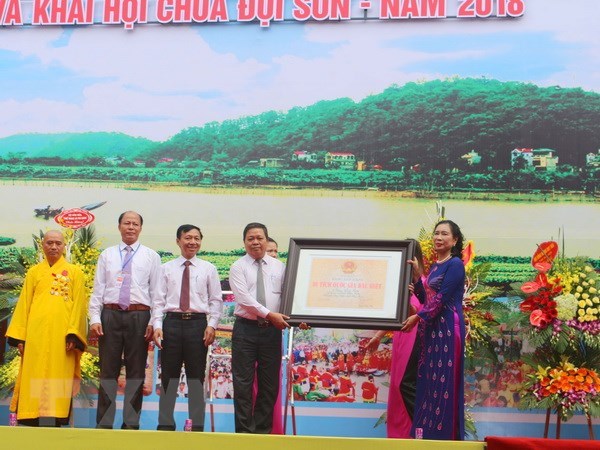
The People’s Committee of Ha Nam province hosted a ceremony on May 3 to receive a certificate recognizing Doi Son (or Long Doi Son) pagoda as a special national relic site and to kick off Doi Son pagoda festival 2018.
At the
ceremony (Source: VNA)
The Doi Son pagoda is located in Doi Son
commune, Duy Tien district, the Red River Delta province
of Ha Nam.
The pagoda was built in 1054 under the reign of King Ly Thanh Tong. It was
expanded from 1118-1121 under the reign of King Ly Nhan Tong along with the
construction of Sung Thien Dien Linh tower.
In the early 15th century, both Doi Son pagoda and Sung Thien Dien Linh tower
were completely destroyed when the Ming aggressors invaded the country. Under
the Later Le, Mac and Nguyen dynasties, the pagoda was rebuilt and its
architecture was gradually restored.
Speaking at the ceremony, Deputy Minister of Culture, Sports and Tourism Dang
Thi Bich Lien asked Ha Nam
province to work out an overall planning scheme for the long-term preservation
of the relic site.
The relic site management board should plant landmarks surrounding the pagoda,
promote the dissemination of information about its historical, cultural,
scientific and artistic values, build plans for restoration and upgrading and
maintain traditional festive rituals, she said.
The official also suggested the provincial authorities to uphold the values of
local typical festivals in a bid to further foster its tourism development.
Source: VNA
With an increasingly vibrant and widespread emulation movement aimed at building cultured residential areas and cultured families, Yen Thuy District has been making steady progress toward improving both the material and spiritual well-being of its people, while fostering a civilized, prosperous, beautiful, and progressive community.
Once lacking recreational spaces and community facilities, Residential Group 2 in Quynh Lam Ward (Hoa Binh City) has recently received attention for the construction of a new, spacious, and fully equipped cultural house. The project followed the model of state support combined with public contributions in both labor and funding.
The "All people unite to build cultural life" movement, which has been effectively integrated with Kim Boi district’s socio-economic development goals, is fostering a lively spirit of emulation across local residential areas, hamlets, villages, public agencies, and enterprises. In addition, through the initiative, traditional cultural values are being preserved and promoted, while community solidarity and mutual support in poverty reduction and economic development are being strengthened.
A working delegation of the Hoa Binh provincial People’s Committee led by its Permanent Vice Chairman Nguyen Van Toan on June 11 inspected the progress of a project to build the Mo Muong Cultural Heritage Conservation Space linked to tourism services in Hop Phong commune, Cao Phong district.
Born and growing in the heroic land of Muong Dong, Dinh Thi Kieu Dung, a resident in Bo town of Kim Boi district, in her childhood was nurtured by the sweet lullabies of her grandmother and mother. These melodies deeply imprinted on her soul, becoming an inseparable part of her love for her ethnic group's culture. For over 20 years, this love for her hometown has driven Dung to research, collect, and pass down the cultural values of the Muong people to future generations.
In the final days of May, the Ethnic Art Troupe of Hoa Binh Province organized performances to serve the people in remote, mountainous, and particularly disadvantaged areas within the province. These were not just ordinary artistic shows, but they were the meaningful journeys aimed at spreading cultural values, enhancing the spiritual life of the people and contributing to the preservation of ethnic minority cultural identities.



